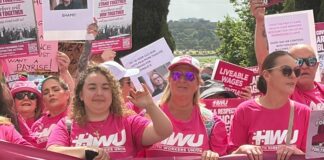Acting to reduce carbon emissions is urgent. The UK Meterological office recently confirmed we face warming of at least four degrees if governments do not get serious about climate. This would lead to catastrophic consequences, melting sea ice at the poles and making human life impossible across most of the planet.
But the NSW government has released plans to build new coal-fired power stations.
Coal power is already Australia’s single biggest source of greenhouse pollution. These plans would increase total NSW emissions by at least 15 per cent.
Two new power plants are proposed—in the Hunter Valley and in the Blue Mountains near Lithgow. In addition there are plans to refit the existing Munmorah plant on the Central Coast to avoid its scheduled closure.
This shows everything that is wrong with the government response to climate change—both state and federal. Instead of driving a transition to much greater use of renewable energy Kevin Rudd’s emissions trading scheme—the CPRS—is allowing this expansion of coal power to happen.
The state government plans to allow the private sector to build and operate the new plants.
This means NSW would have fully privatised power stations. This move comes after the NSW public rejected power privatisation when former Premier Morris Iemma tried it in 2008.
On March 4 the NSW government gave these plans “concept approval”, ignoring environmental concerns.
Privatisation
Building new power plants is part of the NSW government’s sell-off of the power industry. Privatisation would remove the government’s ability to direct a phase-our of coal power. The government has called for buyers of electricity retail companies, and will also lease the “trading rights” to power produced by generators. The private sector would control how the power stations are run by making key decisions.
Development sites for new power stations will also be sold, with the aim of getting the private sector to build new privately-run power stations. After a recently announced delay, it hopes to complete the sale process by the end of 2010.
Will new power plants be gas or coal?
The NSW government claims it is leaving open the option of gas being used as the fuel for the new power stations. But the Government has revealed in Parliament that it will leave this decision to the private sector companies that agree to build the new power stations, which virtually guarantees they will be coal-fired, because:
• Bayswater & Mt Piper are in coal-rich areas, right beside existing coal-fired power stations;
•a gas pipeline from Queensland to Bayswater would cost a billion dollars;
• coal remains cheaper than gas, and the Carbon Pollution Reduction Scheme will not put a high enough price on carbon to make gas competitive.
Do we need new power stations?
Reports show more proactive energy conservation measures would prevent the need for constructing more baseload capacity for at least another six years. This advice has recently been supported by reports from the operator of the national grid.
Renewable energy and jobs
Any new power stations built should use renewable energy. This could provide many more jobs than currently exist in coal-fired power stations. Around 15,000 people are currently employed in the state’s coal-fired power stations and the mines that support them. A recent University of Newcastle report estimates 74,000 jobs could be created by using renewable energy instead.





